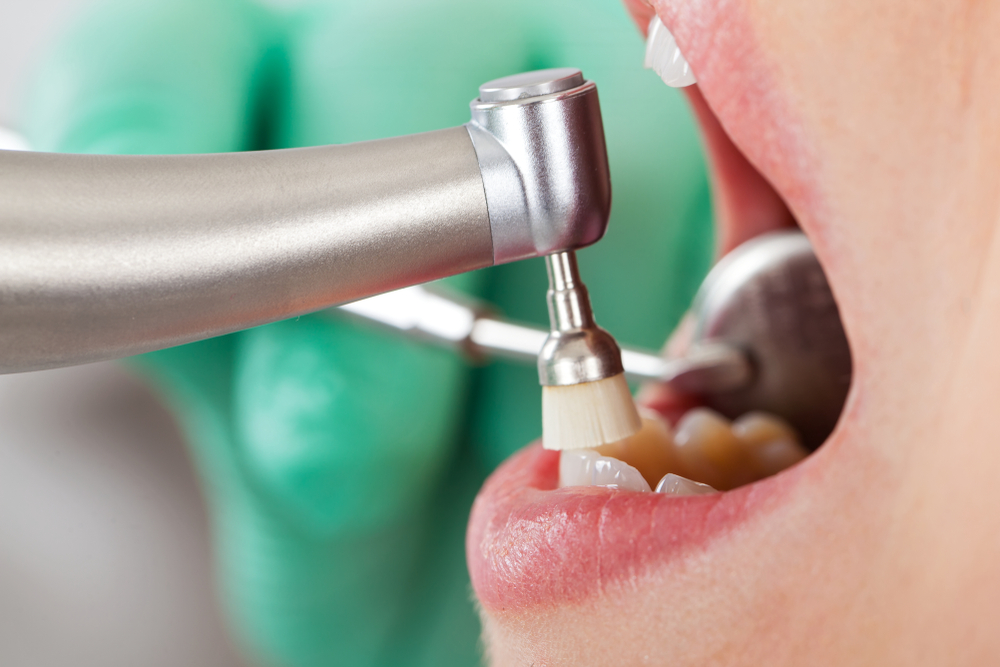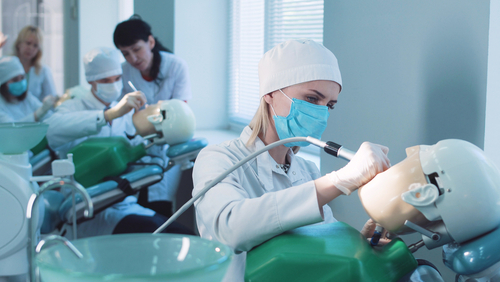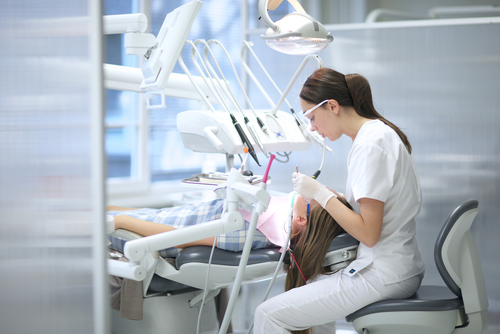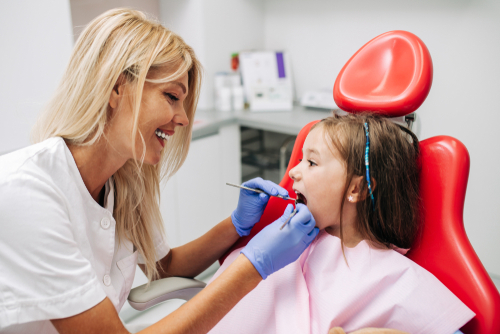Find Your Perfect School
A Dental Hygienist ensures the good oral health of the gums and teeth of adults and children. They take X-rays, clean and polish teeth, work closely with the Dentist, and keep patient records up-to-date. But, is it the right career for you?
Let’s be honest, here… You may or may not have fond memories of the Dental Hygienists you grew up going to. Some people enjoy going to the Dentist and some have had very traumatic experiences.
With today’s technology and extensive training, you can learn the most up-to-date and innovative techniques in the field… to make it easy on your patients!
Earning an Associate degree to become a Registered Dental Hygienist will provide you with many job opportunities directly after completion of your degree program. Typically, those who only have a certificate in the field do not enjoy the pay that degree holders earn.
To earn the largest salaries, potential Dental Hygienists must earn an associate degree. It’s the most common path and will allow you to take advanced coursework through a bachelor’s program if so desired.
Here, we answer your burning questions about what you can expect if you decide to pursue a career as a Registered Dental Hygienist. Plus, we review a few quality schools to consider. At times, the coursework may be tough, but the benefits will outweigh the struggles! Take a look!
Quick Summarization:
Becoming a Registered Dental Hygienist can be a wise and lucrative career choice; however, dental hygienists must have the proper training. Earning an associate degree in the field will supply the correct training to be successful. Good dental health and oral hygiene are directly related to our overall good health care! These accredited dental hygiene programs will get you started.
METHODOLOGY
Let us help you find the best school program for dental hygienists that fits your educational requirements for starting a new career, a job promotion, or simply meeting your personal goals.
Our researchers at PremiumSchools.org utilize these indicators of excellent academic standards to locate exceptional Dental Hygienist school programs designed just for you.
The following schools are listed in random order. As every school displays its unique qualities and strengths, you should search our list based on your needs and career aspirations.
The following factors were considered:
- Offers on-campus, online, or hybrid classes for flexible or convenient attendance without compromising hands-on training for budding Dental Hygienists,
- Exhibits rigorous, yet engaging and innovative training in the field of Dental Hygienists programs and coursework that takes into account the readiness of students to take the next step in their budding career,
- Taught by outstanding faculty consisting of experts in the field of oral hygiene and as Dental Hygienists,
- Held in high esteem among academic agencies, industry organizations, and journalistic resources,
- Displays stellar reviews and feedback from school alumni and students who have successfully completed programs as registered Dental Hygienists,
- Offers a convenient application process,
- Provides exceptional Student Career Centers, Resource Departments, and easy-to-use Learning Management Systems, where applicable,
- Ensures the proper Accreditation in accordance with academic standards in the field of Dental Hygiene.
If you would like to learn more about our selection process, please see our Methodology page!
Best Dental Hygienist Schools
Santa Rosa Junior College
AS Degree in Dental Hygiene
Santa Rosa Junior College, located in Santa Rosa, CA, will prepare you to apply your skills and knowledge to your patient’s excellent oral healthcare.
This CODA accredited school focuses on quality education and its dental program has been in existence since 1999 with exceptional results.
The Associate of Science in Dental Hygiene program from SRJC will prepare you to sit for the National Board Dental Hygiene Examination to become a licensed Dental Hygienist.
Their comprehensive coursework includes a scientific-based and challenging approach to learning by incorporating critical thinking, decision-making, and problem-solving into their curriculum of dental health.
Program offered:
- Associate of Science Degree in Dental Hygiene
Need more information? See Santa Rosa Junior College’s Associate of Science Degree for Dental Hygienists program today!
Carrington College
Associate Degree in Dental Hygiene
Carrington College offers an Associate degree program for aspiring Dental Hygienists that can be completed within two years.
Their dental practice program is offered in Arizona, Idaho, and two locations in California. In addition, you will be prepared to sit for your licensure examination upon completion.
Coursework focuses on comprehensive classes designed to inform students about the Dental Hygienists’ responsibilities in oral healthcare, as you learn excellent communication skills, as well as ethical standards.
You will learn how to take x-rays, remove plaque and stains, update patient records, educate patients about their oral hygiene, along with conducting research to maintain the betterment of oral health. They also offer hands-on training.
Programs offered:
- Associate Degree in Dental Hygiene
- Dental Assisting
Learn more about Carrington College’s Associate degree program in Dental Hygiene.
FREQUENTLY ASKED QUESTIONS
What do Dental Hygienists do?
Dental Hygienists work to educate patients about good oral healthcare. They remove plaque, tartar, and stains from teeth as they clean them. They instruct patients on how to properly brush and floss their teeth, as well as take, process, and report findings of dental x-rays.
Dental Hygienists use several types of small hand tools to perform their job, ranging from scraping picks to ultrasonic instruments.
Typically, they work under the supervision of a licensed dentist in a dental practice. They can choose to work full time or part time in patient care.
Do Dental Hygienists get paid well?
The Bureau of Labor Statistics reports that the average yearly salary of Dental Hygienists, as of May 2022, was $81,400, while the highest 10% earned upwards of $107,640 per year, depending on experience.
Is the field for Dental Hygienists growing?
For potential Dental Hygienists, according to the Bureau of Labor Statistics, the projected job outlook growth rate is positive at an 7% increase between 2022 and 2032, primarily due to the aging population.
Recent studies have linked the correlation between good oral health and good general health conditions, making it a priority for many.
What kind of degree do Dental Hygienists need?
If you aspire to become a Dental Hygienist at a young age, you can start preparing in high school by focusing on chemistry, biology, and math classes. These will prepare you for your next step!
Education requirements for aspiring Dental Hygienists require you to have an associate degree, at the very least. Often, you can locate a reputable Dental Hygiene school at your local community college or vocational school.
An Associate of Science (AS) or an Associate of Arts (AA) degree will prepare you for your career as a Dental Hygienist. In addition, if you would like to earn your bachelor’s degree, your credits should be easily transferred.
If you earn an Associate of Applied Science (AAS) degree, you may not be able to transfer credits into a bachelor’s degree… so, anticipate your end goal while deciding on a program that is right for you! A master’s degree is also available in this field.
Should my Dental Hygiene program be accredited?
Yes, the Commission on Dental Accreditation (CODA) regulates the quality of dental education programs.
How many years does it take to be a Dental Hygienist?
Requirements vary within degree programs, but generally, your Dental Hygiene associate degree program will take 2 – 3 years to complete. Community colleges often offer this degree program.
What will I learn in a Dental Hygienist program?
Naturally, your career will focus on the oral health of your patients; therefore, learning the safest and most productive way to care for them will be of great concern. In a quality Dental Hygiene degree program… you will know just that, and much more!
Coursework will also involve microbiology, radiography, oral pathology, nutrition, pharmacology, immunology, oral disease, how to remove tartar, anatomy, clinical practice, and much more. You will also participate in laboratory and clinical studies.
Will I need to be licensed to be a Dental Hygienist?
Yes, Dental Hygienists must be properly licensed according to each state’s requirements. Your degree program (if properly accredited by CODA), will prepare you to take the National Board Dental Hygiene Examination. After receiving your license, you will be a Registered Dental Hygienist and can use “R.D.H.” after your name!
Can a male be a Dental Hygienist?
Yes, of course, although the field is dominated by females at 98%. Men can certainly become licensed Dental Hygienists if they choose to.
But, on the flip side, you also may have noticed that most dentists are males; however, that is changing, too! There has been an increase recently in the number of women continuing education to become dentists.
How are Dental Hygienists different from Dental Assistants?
While a Dental Hygienist cleans teeth, the Dental Assistant performs dental-related tasks by assisting the Dentist. They also perform clinical administrative duties. Dental Hygienists are generally paid more than Dental Assistants… just in case you were wondering!
Can I earn an Associate degree as a Dental Hygienist online?
Yes, depending on your program, your coursework can often be completed online; however, clinical and hands-on experience will be required on-campus, in most cases.
Are Master’s and Doctorate degrees available for Dental Hygienists who want to learn more?
Typically, Dental Hygienists will need to receive training from a certificate program or earn an associate degree at the very least. For those who aspire to learn more about their trade, choosing an accredited program offering a bachelor’s degree in oral care is a great idea.
Furthermore, if you choose to further your education as a Dental Hygienist, master’s degree and doctorate degree programs are available; however, they are less common and may be very hard to locate, especially one in your area.
And, here is another option for the eager learner… Have you considered becoming a Dentist yourself? If not, it’s something to think about!
Key Takeaways
Registered Dental Hygienists assist their patients in oral health care. Are you ready to become one? Check out these key points:
- Dental Hygienists are major contributors to the healthcare system and oral health.
- To become a Register Dental Hygienist, you must be properly trained and licensed in oral health.
- The Bureau of Labor Statistics predicts a positive job outlook and lucrative pay for registered Dental Hygienists.
- An accredited dental hygiene program can be completed in 2-3 years.
- Dental Hygienists work in a dental hygiene practice, clinical practice, nursing homes, or dental offices; often in a quiet and stress-free environment, generally not in “emergency care” situations.
- Generally, a registered Dental Hygienist enjoys their work and finds it very rewarding.
- For more information, see the American Dental Association.
- Continuing education opportunities, such as earning your master’s degree, is a great idea as well if you’d like.
- If you are ready to become a Dental Hygienist, check out the above programs and get started today!
Additional Resources:





